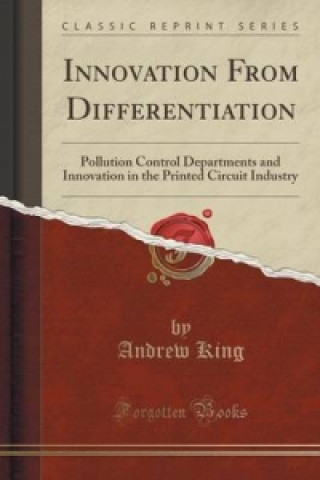
Kod: 09830576
Innovation from Differentiation
Autor Andrew King
Excerpt from Innovation From Differentiation: Pollution Control Departments and Innovation in the Printed Circuit Industry Organizational theorists, industry professionals and policy analysts predict that firms tend to respond ... więcej
- Język:
 Angielski
Angielski - Oprawa: Miękka
- Liczba stron: 32
Wydawca: Forgotten Books, 2015
- Więcej informacji o książce

Zobacz książki o podobnej tematyce
-

Dune
34.67 zł -33 % -

Haunting Adeline
125.17 zł -1 % -

Berserk Deluxe Volume 2
212.16 zł -1 % -

White Nights
15.22 zł -23 % -

Powerless
48.50 zł -11 % -

Atomic Habits
57.22 zł -28 % -

Dune Messiah
46.09 zł -3 % -

Berserk Deluxe Volume 3
217.07 zł -3 % -

One Day
32.46 zł -36 % -

Berserk Deluxe Volume 1
210.76 zł -2 % -

Iron Flame
60.82 zł -28 % -

Surrounded by Idiots
36.57 zł -28 % -

Harry Potter and the Prisoner of Azkaban (Minalima Edition)
169.57 zł -2 % -

Gravity Falls Journal 3
88.79 zł -

Heaven Official's Blessing: Tian Guan Ci Fu (Novel) Vol. 1
85.18 zł -5 % -

The Creative Act
102.42 zł -12 % -

Dune
47.09 zł -23 % -

Hunting Adeline
125.87 zł -4 % -

A Little Life
46.79 zł -14 % -

Children of Dune
46.49 zł -2 % -

Heaven Official's Blessing: Tian Guan Ci Fu (Novel) Vol. 2
77.36 zł -14 %
Powiadomienie o dostępności
Wpisz swój adres e-mail, aby otrzymać od nas powiadomienie,
gdy książka będzie dostępna. Proste, prawda?
Więcej informacji o Innovation from Differentiation
 Opis
Opis
Excerpt from Innovation From Differentiation: Pollution Control Departments and Innovation in the Printed Circuit Industry Organizational theorists, industry professionals and policy analysts predict that firms tend to respond to environmental regulation by creating pollution control departments to span the boundary between the organization and the surrounding society. Theory predicts that these departments will insulate the firm from changing conditions and either 1) cause continuance of efficient operations, or 2) prevent adaptation to new conditions. In an empirical study, I find that in some firms pollution control departments act not as insulators, but as information and innovation conduits, and thereby help improve the production process. I find that pollution control departments have access to unique data from inside and outside of the organization, and that this information derives in part from their specialized role. Thus, I propose that organizations that have boundary-spanning units and allow these units extensive communication with the rest of the organization have the highest performance relative to both existing (i.e. cost and quality) and new (i.e. environmental) criteria. Introduction Many companies now face challenges of both tougher global competition and more stringent requirements to protect the natural environment. Some firms like Union Carbide have responded by creating separate departments and functions to mediate between the firm and environmental regulators, while others like 3M and DOW Chemical have attempted to integrate pollution control responsibility into existing organizational roles [1-3]. Theory suggests that these two approaches present a dilemma: a separate department allows scale efficiencies, controlled risk, and efficient production, while an integrated approach allows the firm to learn and adapt to new conditions [4-7]. Whatever their view of the effect of such departments, these theories predict that most firms will respond to changing environmental conditions by forming specialized pollution control departments, and that once created, these departments will have little interaction with the rest of the firm and little role in process innovation [4, 7, 8]. This paper investigates the role of pollution control departments in information transfer and process innovation. The twelve printed circuit fabrication firms studied all responded to increased regulation by creating organizationally separate pollution control departments, and these departments reported initially having little interaction (measured as communication) with the rest of the organization. In spite of these initial relations, over time some pollution control departments came to interact frequently with the rest of the organization. These pollution control departments often provided information and innovation ideas to process engineers that resulted in process improvement (relative to cost, quality and capability). Pollution control departments were able to make these process improvements because they had unique information, and that this information derived in part from their specialized role. Finally, I propose that a balance between separation and integration may lead both to better process performance (cost and quality) and to better environmental performance. Theoretical Background Pollution control departments span the boundary between the organization and its surroundings. Organizational theory provides four main perspectives on the effect and behavior of such boundary-spanning departments. Thompson [4] claims that such departments allow organizations to remain efficient in the face of changing business conditions, while Bums and Stalker's work [5] suggests that such organizational structures may reduce adaptability. Proponents of "lean production" or "total quality" argue that such
 Szczegóły książki
Szczegóły książki
Kategoria Książki po angielsku Reference, information & interdisciplinary subjects Encyclopaedias & reference works
- Pełny tytuł: Innovation from Differentiation
- Podtytuł: Pollution Control Departments and Innovation in the Printed Circuit Industry (Classic Reprint)
- Autor: Andrew King
- Język:
 Angielski
Angielski - Oprawa: Miękka
- Liczba stron: 32
- EAN: 9781332245758
- ISBN: 9781332245758
- ID: 09830576
- Wydawca: Forgotten Books
- Waga: 59 g
- Wymiary: 229 × 152 × 2 mm
- Data wydania: 05. August 2015
zadowolonych klientów
Od roku 2008 obsłużyliśmy wielu miłośników książek, ale dla nas każdy był tym wyjątkowym.
Copyright! ©2008-24 libristo.pl Wszelkie prawa zastrzeżonePrywatnieCookies



 21 milionów książek
21 milionów książek Dostawa 10.99 zł
Dostawa 10.99 zł (32) 444 93 66 (8-15.30h)
(32) 444 93 66 (8-15.30h)